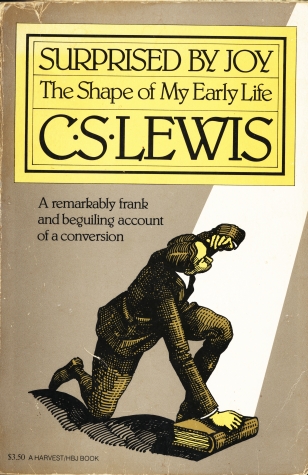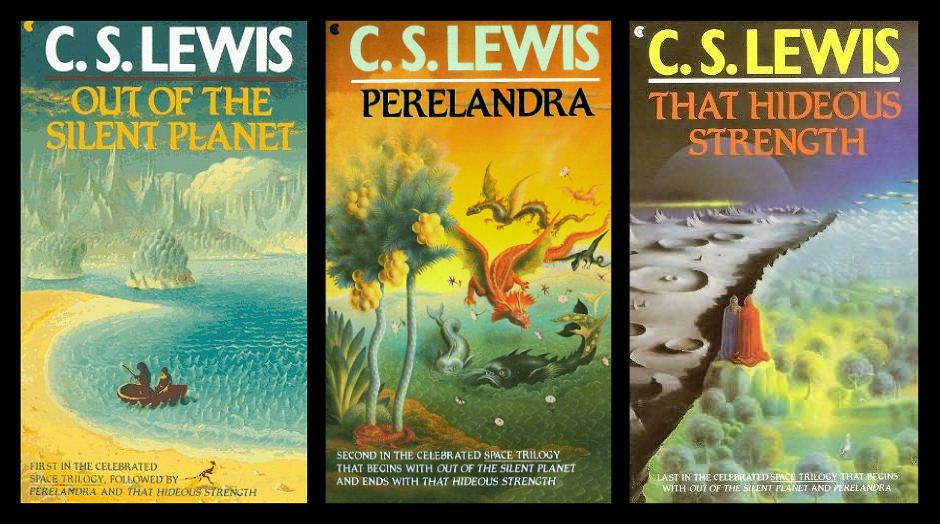One of Lewis’s comments in his autobiography, Surprised by Joy, came to mind recently as I thought about the path my own life has taken. Lewis was an intensely rational person, a trait drilled into him by his tutor, William Kirkpatrick. At the same time, he was a person who reveled in imaginative works of literature. At various times in his life, one or the other would come to the forefront. There was a time, though, as a young man and well before his conversion, when he was in distress about his dual nature.
In writing about his quest for joy, which was directly connected with his imaginative nature, Lewis despaired about the state of his mind and his life, since he viewed his imaginative side as at odds with the rational, intellectual side. “The two hemispheres of my mind were in the sharpest contrast,” he bemoaned. “On the one side a many-islanded sea of poetry and myth; on the other a glib and shallow ‘rationalism.'” What made this so intolerable? “Nearly all that I loved I believed to be imaginary; nearly all that I believed to be real I thought grim and meaningless.”
It wasn’t until Lewis crossed the boundary into Christian faith that he discovered how to meld the two sides together. In fact, his first Christian work, The Pilgrim’s Regress, is a masterful blending of the two. In that book, he rationally critiqued various philosophies while doing so in an imaginative allegory that traced the winding road his life had taken before he turned that life over to Christ.
So how does this apply to me?
As I think back on my younger days, I recall that my favorite reading was science fiction. I probably read all of our town’s small library’s science fiction holdings in a few short years. Yet I have also been theologically and philosophically inclined. A lot of the philosophical side was of a political nature. My undergraduate degree in radio, television, and film production fed the imaginative side. Lewis’s The Great Divorce formed the basis for my final project in television production. My later master’s and doctoral degrees in history stressed the intellectual side, as I learned the significance of thorough research, accurate documentation, precise writing, and well-argued positions, not only on historical events but also in politics and public policy.
That intellectual/philosophical/rational side (and my theology also was quite rational, as I have always believed God intended for us to understand Him and His salvation) dominated my life as I entered into academia as a full-time history and government professor.
Yet I maintained a clear and distinct attraction to the imaginative world and literature. The key to that, I think, was my ongoing fascination with Lewis. I read the Ransom Trilogy more often than I can remember. When I finally read the Chronicles of Narnia (I mistakenly thought for some time that they were merely children’s books), I felt that same longing for the imaginative. One can also include The Screwtape Letters and my repeated reading of The Great Divorce as cornerstones for that part of my mind.
Then, in 2014, I was granted a sabbatical—an entire year to research and write. My main goal for that year was to work with a colleague on a book devoted to spiritual advisors to presidents. I planned, and carried out, trips to six presidential libraries and amassed a mountain of material on the subject. No book resulted from that effort. At the same time, though, I had in the back of my mind to research Lewis in some way and hope that I could write something about him. So when I went to Wheaton College to research at the Billy Graham Center for information on Graham’s link to presidents, I also took advantage of the visit to go for the first time to the Marion E. Wade Center where all things Lewis could be investigated.
What could a historian who teaches American history do with C. S. Lewis? He never even came to America. As I researched at the Wade, I believe the Lord led me to the idea that I should write about his contacts with Americans and how much influence he has had on this country. I’ve told this story before, so I will omit details. Let me just say that I concluded there was a need for a book like that.
America Discovers C. S. Lewis was the result. Again, I will refrain from offering details on the book (I’ve done that more than once in this blog before). My intent here is to show how this sidetrack into Lewis research has affected my thinking ever since.
Prior to the writing and publication of my Lewis book, my primary focus in teaching and writing had become political. One can starve spiritually when one makes that the focus, a reality I discovered as I watched the changing landscape of American politics over the past decade. In Lewis I found, not an escape hatch, but a new direction for my thinking—a positive direction. Too much of the politics of our time has become polluted with hatred, and I’ve seen far too many people who claim to be Christians falling into that mindset. It’s disturbing, to say the least.
Lewis, instead, offers a balance that has kept me on track with God and my fellow man. His blending of intellectual rigor alongside his fertile imagination has inspired me to follow in his footsteps. I continue to teach a university class on his writings, both the apologetic and the fantasy. I appreciate both deeply. Many of you know that I am currently teaching a course at my church on the Ransom Trilogy.
Teaching this trilogy allows me to delve more deeply into the imagination while not sacrificing the intellect. Perhaps for the first time in my life, I sense a balance between the two. No longer does one dominate the other; rather, they work in tandem to help others understand God’s truths. And that is the task the Lord has given me: teach His truth in as many ways as I can. My goal is to be faithful to that calling.




